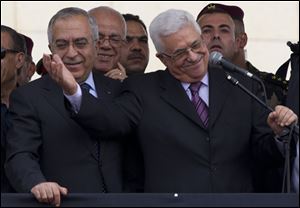
Palestinians hail Abbas as hero after push for statehood at U.N.
9/26/2011
Palestinian leader Mahmoud Abbas, with his arm extended, tells supporters on the West Bank that they are part of a ‘Palestinian spring.’
RAMALLAH, West Bank — Two days after seeking full membership for a state of Palestine in the United Nations, Palestinian leader Mahmoud Abbas returned to a hero’s welcome Sunday and told supporters they are part of a “Palestinian Spring.”
The crowd chanted Mr. Abbas’ name as he spoke.
The call Friday for the United Nations to recognize Palestinian independence has transformed Mr. Abbas in the eyes of many Palestinians from gray bureaucrat to champion of their rights. Although Israel and the United States oppose the move and consider it a step back for long-stalled peace talks, it could help Mr. Abbas overcome internal struggles and gain the support he will need to get a deal through one day.
In a brief address outside his headquarters in Ramallah, Mr. Abbas told the crowd a “Palestinian Spring” had been born, similar to the mass demonstrations sweeping the region in what has become known as the Arab Spring.
“We have told the world that there is the Arab Spring, but the Palestinian Spring is here,” he said. “A popular spring, a populist spring, a spring of peaceful struggle that will reach its goal.”
Mr. Abbas cautioned that the Palestinians face a “long path” ahead. “There are those who would put out obstacles ... but with your presence they will fall and we will reach our end,” he said.
In seeking U.N. recognition, Mr. Abbas “moved the feelings and emotions of the ordinary Palestinian,” said Mahdi Abdul-Hadi, a respected Palestinian academic in Jerusalem. “He gave the people national pride after they were denied it.”
Mr. Abbas’ calls for nonviolence and his successes in restoring law and order to the West Bank have won him respect in Israel and abroad.
But at home he is often seen as weak and ineffectual in his dealings with Israel and the rival Hamas movement, which seized control of the Gaza Strip from his forces in 2007.
Mr. Abbas has asked the U.N. Security Council to recognize an independent Palestine in the West Bank, east Jerusalem, and Gaza Strip — areas captured by Israel in the 1967 Mideast war.
About 500,000 Jewish settlers now live in the West Bank and east Jerusalem.
Israel withdrew from Gaza in 2005.
Mr. Abbas turned to the United Nations in frustration after nearly two decades of unsuccessful peace efforts that were derailed at various times by violence, indecision, and intransigence.
Mr. Abbas said he will return to the negotiating table only if Israel halts settlement construction and accepts the pre-1967 lines as the basis for talks.
Israel and the United States oppose the U.N. bid, saying there is no substitute for direct negotiations. But with Israel continuing to build settlements, Mr. Abbas says there is no point in talking.
It is unclear what the U.N. application will accomplish.
The United States, as a member of the Security Council, has promised to veto the request if the Palestinians can muster the nine votes needed for passage — which is far from certain.
If that happens, the Palestinians say they will seek enhanced observer status from the General Assembly, as a “nonmember state.”
Passage is virtually guaranteed, but this would be largely symbolic.
The Palestinians acknowledge that any victory at the U.N. will not change the situation on the ground. But they believe an international stamp of approval of a Palestine in the 1967 lines would bolster their negotiating position in the future.
The issue is likely to face weeks, perhaps months, of diplomatic wrangling.
The international community, meanwhile, is continuing to search for a formula to bring Israel and the Palestinians back to negotiations.
The Quartet of Mideast mediators — the United States, European Union, Russia, and U.N. — issued a statement Friday calling for a resumption of peace talks without preconditions and a target for a final agreement by the end of 2012.
Israeli Foreign Minister Avigdor Lieberman said Sunday that his government should accept the Quartet proposal.
But Mr. Abbas signaled it was a nonstarter if it doesn’t include a settlement freeze.
Mr. Lieberman has said that he would not accept a settlement freeze “even for one day,” calling it a red line that could cause him to pull his Yisrael Beiteinu party out of the governing coalition.
Mr. Lieberman and others say the Palestinian application for U.N. membership violates the 1993 Oslo peace accords, which committed both sides to work out their differences in negotiations.
As a result, they say Israel should annex all or part of the West Bank, terminate the Oslo accords, or cut off tax transfers that Israeli ports collect on behalf of the Palestinian Authority. Those revenues, worth about $100 million a month, fund much of the authority’s budget.
But concerns are growing that such a harsh response could backfire for Israel by fueling extremism and increasing instability in the West Bank.